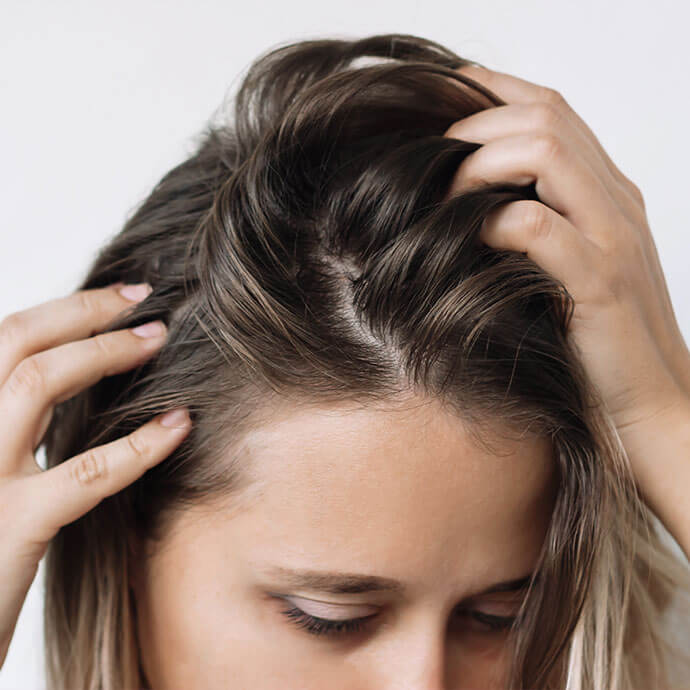Have you ever wondered why your hair gets oily so fast, even after a fresh wash? You're not alone. Many people struggle with this issue, and understanding the reasons behind it is crucial for maintaining healthy hair. Oily hair can be frustrating, especially when it affects your confidence and appearance. In this article, we’ll explore the reasons why your hair gets oily quickly and provide actionable solutions to help you manage it effectively.
Oily hair is often caused by a combination of factors, including genetics, lifestyle, and hair care habits. While some people naturally produce more sebum than others, external influences such as diet, stress, and environmental conditions can also play a significant role. By identifying the root causes, you can take steps to control excess oil production and keep your hair looking fresh and clean for longer.
In this comprehensive guide, we will delve into the science behind oily hair, discuss effective remedies, and share expert tips for maintaining a healthy scalp. Whether you’re dealing with occasional oiliness or a chronic issue, this article will equip you with the knowledge and tools to manage your hair better.
Read also:Door Lock On Shark Tank A Comprehensive Guide To Smart Home Security
Table of Contents
- What Causes Oily Hair?
- The Role of Genetics in Oily Hair
- How Diet Affects Hair Oil Production
- Lifestyle Factors That Contribute to Oily Hair
- Choosing the Right Hair Products
- How Often Should You Wash Oily Hair?
- Natural Remedies for Oily Hair
- Expert Tips for Managing Oily Hair
- Preventing Oily Hair: Best Practices
- Conclusion: Take Control of Your Hair Health
What Causes Oily Hair?
Oily hair occurs when the sebaceous glands in your scalp produce excess sebum, a natural oil that moisturizes and protects your hair. While sebum is essential for maintaining healthy hair, too much of it can make your hair look greasy and weighed down. Understanding the underlying causes is the first step toward addressing this issue.
Several factors contribute to oily hair, including hormonal changes, improper hair care routines, and environmental influences. For instance, stress and poor diet can trigger the sebaceous glands to overproduce sebum, leading to faster oil buildup. Additionally, using heavy hair products or washing your hair too frequently can strip your scalp of its natural oils, prompting it to produce even more sebum as compensation.
Key Causes of Oily Hair
- Hormonal fluctuations
- Genetic predisposition
- Improper hair care practices
- Environmental factors like pollution and humidity
- Use of oil-based hair products
The Role of Genetics in Oily Hair
Genetics plays a significant role in determining how oily your hair is. If your parents or close relatives have oily hair, there’s a good chance you’ll experience the same issue. This is because the size and activity level of your sebaceous glands are largely determined by your genetic makeup.
People with oily hair often inherit larger sebaceous glands that produce more sebum. While you can’t change your genetics, you can modify your hair care routine to minimize the effects of excess oil production. Using lightweight, non-comedogenic products and avoiding heavy styling creams can help keep your hair looking fresh and clean.
How Diet Affects Hair Oil Production
Your diet can significantly impact the health of your hair and scalp. Consuming a balanced diet rich in vitamins and minerals is essential for maintaining optimal hair health. On the other hand, a diet high in processed foods, sugar, and unhealthy fats can stimulate the production of sebum, leading to oilier hair.
Research suggests that certain foods, such as dairy products and refined carbohydrates, may exacerbate oily hair by triggering hormonal changes. To reduce oil production, consider incorporating more fruits, vegetables, lean proteins, and omega-3 fatty acids into your diet. These nutrients help regulate sebum production and promote healthier hair growth.
Read also:Unity Mortuary Of Anderson Your Trusted Partner In Funeral Services
Lifestyle Factors That Contribute to Oily Hair
Your daily habits and lifestyle choices can also influence how oily your hair becomes. Stress, lack of sleep, and exposure to pollution are just a few factors that can disrupt your scalp’s natural balance and lead to excess oil production.
Top Lifestyle Factors to Watch Out For
- Stress: Chronic stress can increase hormone levels that stimulate sebum production.
- Sleep: Poor sleep quality can weaken your immune system and affect your scalp’s health.
- Environmental exposure: Pollution and humidity can clog hair follicles and trap oil on your scalp.
Making simple lifestyle adjustments, such as practicing stress-reducing techniques and protecting your hair from environmental damage, can make a noticeable difference in managing oily hair.
Choosing the Right Hair Products
Using the right hair products is crucial for controlling oil production and maintaining a healthy scalp. Many people with oily hair make the mistake of using heavy shampoos and conditioners that weigh their hair down. Instead, opt for lightweight, oil-free formulas specifically designed for oily hair types.
Look for products containing ingredients like salicylic acid, tea tree oil, and clay, which help absorb excess oil and cleanse the scalp. Avoid sulfates and alcohol-based products, as they can strip your hair of its natural moisture and lead to overcompensation by the sebaceous glands.
How Often Should You Wash Oily Hair?
One of the most common questions people with oily hair ask is how often they should wash their hair. While it may seem logical to wash your hair daily to remove excess oil, over-washing can actually worsen the problem. Washing too frequently can strip your scalp of its natural oils, prompting it to produce even more sebum to compensate.
Experts recommend washing oily hair every other day or every two to three days, depending on your hair type and lifestyle. If you need to freshen up between washes, consider using dry shampoo to absorb excess oil and add volume to your hair. This approach helps maintain a healthy balance without overstimulating your sebaceous glands.
Natural Remedies for Oily Hair
In addition to adjusting your hair care routine, you can try natural remedies to manage oily hair. Many plant-based ingredients have properties that help control sebum production and cleanse the scalp effectively. Here are a few popular natural remedies for oily hair:
Natural Remedies to Try
- Apple cider vinegar rinse: Helps balance scalp pH and reduce oil buildup.
- Clay masks: Absorbs excess oil and detoxifies the scalp.
- Tea tree oil: Has antimicrobial properties that promote a healthy scalp environment.
- Aloe vera gel: Soothes the scalp and regulates oil production.
Incorporating these natural remedies into your hair care routine can provide long-term benefits without the use of harsh chemicals.
Expert Tips for Managing Oily Hair
Managing oily hair requires a combination of proper hair care practices and lifestyle adjustments. Here are some expert tips to help you keep your hair looking fresh and clean:
- Wash your hair with lukewarm water to avoid stripping natural oils.
- Use a wide-tooth comb to distribute sebum evenly throughout your hair.
- Avoid touching your hair frequently, as it transfers oils from your hands to your scalp.
- Protect your hair from pollution and UV rays by wearing a hat or using protective sprays.
By following these tips, you can effectively manage oily hair and maintain a healthy scalp.
Preventing Oily Hair: Best Practices
Preventing oily hair starts with understanding your hair type and adopting preventive measures. Regular scalp care, proper product selection, and healthy lifestyle habits can all contribute to reducing oil production. Here are some best practices for preventing oily hair:
- Maintain a consistent hair care routine tailored to your specific needs.
- Stay hydrated and eat a balanced diet rich in essential nutrients.
- Avoid over-styling and excessive use of heat tools.
- Consult a dermatologist if your oily hair is accompanied by scalp irritation or other issues.
Implementing these practices into your daily routine can help you achieve healthier, less oily hair over time.
Conclusion: Take Control of Your Hair Health
Oily hair can be a challenging issue to manage, but with the right knowledge and tools, you can take control of your hair health. By understanding the causes of oily hair and implementing effective solutions, you can reduce oil production and maintain a fresh, clean appearance.
We encourage you to try the tips and remedies discussed in this article and share your experiences in the comments below. If you found this article helpful, don’t forget to share it with your friends and family. For more expert advice on hair care and beauty, explore our other articles on the site.
Remember, managing oily hair is a journey, and small changes can make a big difference. Stay consistent, and you’ll be on your way to healthier, more manageable hair in no time!





